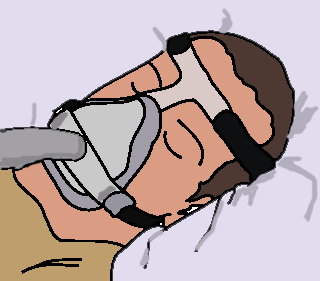Severe Sleep Apnea Treatment
Discover What is the Best Treatment for Severe Sleep Apnea
In this page you'll discover what is the most effective severe sleep apnea treatment.
As you probably think, severe disorders need to be treated with severe treatments, like surgery with or without mechanical ventilation.
Severe sleep apnea doesn't make exception from this rule, and knowing you have such high degree of severity of a sleep disorder should make you and your doctor alert and send you to a sleep study immediately.
You should do your best to improve your sleep disorder - your life is in danger.
Because you're already very tired during the day, it will be difficult to fix things by your own. Family and friends have to be close to you now, at least until you start your severe sleep apnea treatment with success.
How Should I Know if I have Severe Apnea?
Usually, your GP should see that something seriously wrong is happening with you.
If you already have been tested in a sleep disorder center, then you should see your Apnea Hypopnea Index (AHI) - measured on the overnight sleep study - greater than 30.
For more info about AHI, see Apnea Hypopnea Index.
The Symptoms of Severe Sleep Apnea
To give you a reference, the next symptoms describe a patient with severe apnea. So, do you have these signs?
| Severe Sleep Apnea Symptoms | |
You can recognize a patient with severe sleep apnea if he has the following symptoms: |
|
|
|
Severe Sleep Apnea Treatments
What are the best treatments for severe apnea? Well, there are numerous treatment options for OSA.
These treatments range from behavioral modifications and positional therapy to nightly use of positive airway pressure devices to surgical treatments that alter airway anatomy.
However, when you have an AHI greater than 30, with risks of heart attacks and stroke, the behavioral and positional therapies might not be useful enough.
Continuous Positive Airway Pressure
The continuous positive airway pressure is recognized as the most effective treatment for obstructive sleep apnea - if you can tolerate wearing the device.
The CPAP is most useful in moderate to severe sleep apnea, and it should be the first option for severe sleep apnea treatment.
It is appropriate for every patient with moderate or severe OSA to try the CPAP treatment before undergoing other methods of therapy.
Surgical Treatments for Severe Sleep Apnea
The next best severe sleep apnea treatment is surgery, which is typically effective, sometimes reversible, widely available, but...it has a few side effects.
The surgical therapy for obstructive sleep apnea can be classified in three categories:
Surgery focused on the upper airway area
This type of surgery is often useful if a patient with sleep apnea doesn't receive the right CPAP pressure due to airway obstruction, such as:
- nasal obstruction,
- large tonsils and adenoids,
- turbinate hypertrophy,
- deviated septum,
- nasal polyps.
So, if your airway is the cause for a difficult CPAP therapy, consider the surgical treatment including tonsillectomy, adenoidectomy, or nasal surgery. These surgeries may improve compliance for CPAP treatment.
Surgery without altering the upper airway
Examples: bariatric surgery, or tracheotomy.
Tracheotomy is typically reserved only for morbidly obese patients with Pickwickian Syndrome or who are unable to tolerate positive airway pressure.
Some doctors believe tracheotomy is the most effective severe sleep apnea treatment. Unfortunately, breathing through a hole in your neck during the night is not an easy thought for anyone...
Since obesity is a major cause for severe sleep apnea, bariatric surgery has the potential to significantly reduce the patient's weight and to improve sleep apnea. However, there are also some side effects.
Fortunately, bariatric surgery has the significant advantage of treating other health problems associated with obesity, such as diabetes and cardiovascular disease.
You can consider bariatric surgery if you have Body Mass Index (BMI) > 40.
Surgery that directly alters the upper airway to reduce obstruction of breathing during sleep
Examples:
- Laser-assisted uvulopalatoplasty (LAUP)
- Uvulopalatopharyngoplasty (UPPP)
- Transpalatal advancement pharyngoplasty
- radiofrequency tongue base reduction
- Hyo-mandibular suspension
- and others
Bottom line... There is no severe sleep apnea treatment out there better than CPAP, except tracheotomy in the most morbid cases.
Regarding surgery, I personally would have to give the CPAP a REALLY, really good try before I choose this route.
Of course there are some people who simply will never be able to make CPAP work, and therefore a surgery, even a tracheotomy or bariatric surgery, is a saver.








